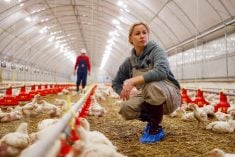UPDATED at 1125 CST – May 30, 2016 – Manitoba’s sixth case of porcine epidemic diarrhea virus was confirmed May 26 in a batch farrow sow barn on a farm in the southeast.
It is the first incident in the province since January 2015, and all previously infected barns had since been rid of the virus.
The new case comes weeks after the Canadian Food Inspection Agency cancelled an emergency truck washing protocol that was supported by hog producers across Western Canada.
Manitoba Pork Council chair George Matheson said the owner of the infected barn is co-operating fully with the chief provincial veterinarian, his own veterinarian and the council.
Read Also

B.C. ostriches culled, CFIA confirms
Ostriches on an embattled Edgewood, B.C. farm have been culled after a prolonged legal battle, the Canadian Food Inspection Agency has confirmed.
“It’s emotionally devastating and it hurts financially, of course, but he’s being very co-operative with the province and the Manitoba Pork Council, and that’s the best way to be to, number one, keep the virus from spreading, and number two, eradicate it from his farm,” said Matheson.
Producers within a five-kilometre radius of the farm have been alerted and are monitoring their herds.
PED virus is highly contagious and is almost always fatal to piglets. It has killed millions of young pigs in the United States, but cases have been limited to six infected premises in Western Canada. Ontario and Quebec have had more than 90 cases, still substantially fewer than the thousands of barns infected in the U.S.
Matheson said the farm owner and veterinarians will develop a plan of attack against the latest case in Manitoba. Infected piglets may be quickly slaughtered, and the virus will then work its way through the sow herd.
Older animals can survive the virus, although production is limited while they are fighting it and developing immunity.
About 70,000 pigs are trucked to the U.S. from Canada every week, potentially putting transport trucks in contact with the PED virus.
The CFIA put an emergency truck wash protocol in place in February 2014, which allowed returning trucks to be sealed at the border and then thoroughly washed and disinfected at specialized Canadian facilities.
The CFIA cancelled that protocol May 2 and required trucks to be washed on the U.S. side, where facilities are said to be less thorough and in some cases use recycled water that may contain the virus.
Hog producer associations protested the change, and Matheson said the timing of this latest PED case is interesting, to say the least.
“It would be very difficult to pinpoint where it came from, but you know, it did happen just after the CFIA ended the truck wash protocol that we had in place, so it could very well have … come in from the States and have been due to the new truck washing protocol,” he said.
“Logically, if (the CFIA) expect us to wash our trucks down there as opposed to the state of the art facility we have in Blumenort, we would have a greater chance of contracting PED in this province. So it may very well be due to the change in regulation.”
Matheson said the pork council and other pork organizations and veterinarians continue to press the CFIA to reinstate the emergency protocol.
Timing of this latest PED case might bolster those efforts.
“It will definitely support our argument that the system that we had in place was the best way to keep PED out of the province, considering the timing of it,” he said.
“I hope that the CFIA looks at it seriously.”
In the meantime, producers are advised to have trucks washed a second time on the Canadian side of the border and follow strict biosecurity on their farms.
Contact barb.glen@producer.com















